Revision rhinoplasty in Korea
See the nose ▼
Surgery Information
- • Duration: 2 hours
- • Anesthesia: Local (Deep Sleep) Anesthesia
- • Hospitalization: N/A
- • Stitch Removal: 5-7 days after
- • Clinic Visit: 2-3 times
- • Recovery Period: Return to everyday activity 1 week after
What is Nose Revision/ Revision Rhinoplasty?

Revision rhinoplasty is a follow-up surgery after primary surgery. Usually, functional issues, aesthetic concerns, or both, drive the need for revision surgery. Revision rhinoplasty can help improve the contour, shape, or function of the nose
Here are the cases of revision rhinoplasty:
1) Unsatisfactory nose: If there is no effect after nose surgery
2) Exaggerated nose: If the nose bridge & tip is too high
3) Implants Side effect 1: Nose tip is lowered or reddened
4) Implants Side Effects 2: Silicone showing
5) Side effects of implants 3: When the implants move
6) Nasal congestion: clogged nose after nose surgery
7) Inflamed nose: inflammation after surgery
8) Capsular contracture: those whose nose is transformed due to Capsular contracture
9) Nose / Nostril: those whose nose or nostril look distorted or asymmetrical
Revision Rhinoplasty: Unsatisfactory nose

▶ If there is no effect after nose surgery Nose bridge: The current patient's nose shape and thickness of the nose are checked and the appropriate implant is reinserted. Remove all implants and cartilage that were used previously.
Nose tip: Removal of all implants or cartilage used in the nose at the previous surgery. Reshape the nasal tip using autologous cartilage and harmonizing the ratio of the nose bridge
Revision Rhinoplasty: Exaggerated nose
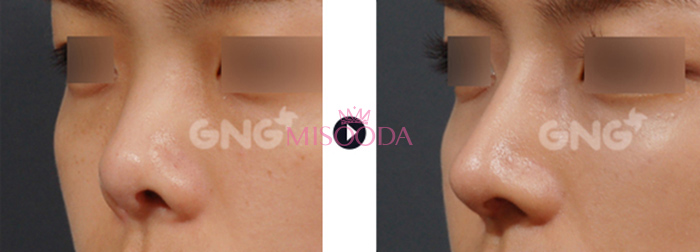
▶ If the nose bridge & tip is too high Nose bridge: Depending on the nose condition of the patient, nasal osteotomy may be performed. Reinforcement of the implant that is appropriate for the patient after hump removal.
Nose tip: It is the most frequent side effect when using L-shaped silicon. Use autologous cartilage instead of L-shaped silicon for natural nose shape.
Revision Rhinoplasty: Implants Side effect 1
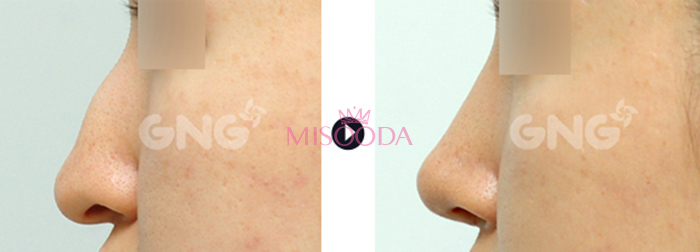
▶ Nose tip is lowered or reddened When the tip of the nose is lowered: Correct with the cartilage used for the first operation (or removal if necessary) and additional cartilage
When the tip of the nose is red: If the skin is thin or sensitive, correct by covering silicon with the dermis when doing revision tiplasty
Revision Rhinoplasty: Implants Side Effects 2
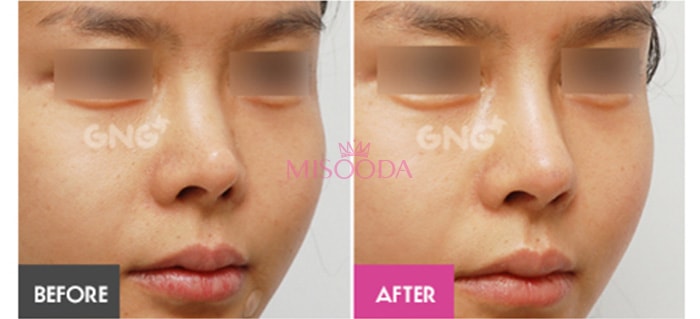
▶ Silicone see-through
It is a side effect that is most common in patients with thin or sensitive skin
Nose bridge: Re-insert a lower silicon → Correct with the dermis or fascia putting over the silicone to prevent it from seeing through
Nose Tip: Correct via autologous cartilage instead of non-silicone (use additional autologous dermis and fascia if necessary)
*Do not use silicone if you are concerned about inflammation. Correct through autologous cartilage or dermis
Revision Rhinoplasty: Side effects of implants 3
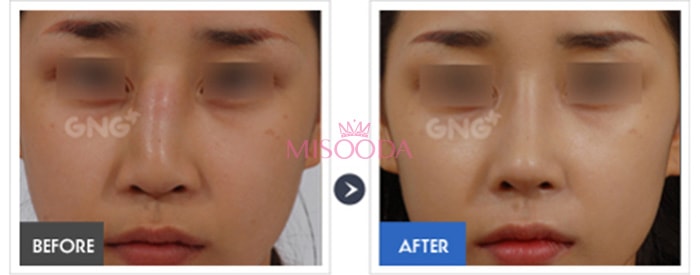
▶ When the implants move
If the operation is performed with neglect of the asymmetry of the patient or the imbalance of the soft tissue force, the movement of the implant causes the nose to appear distorted.
In this case, revision nose surgery has to be done after re-measurement of silicone shape and height appropriate for the patient. In the event of an inflammation of the surgical site, treatment of inflammation or minimization of soft tissue damage is needed.
Revision Rhinoplasty: Nasal congestion

Nose is blocked as side effects after nose surgery
- If the mucous membrane inside the nose is swollen or hematoma has occurred
- When skin bumpiness occurs
- When the outer alar cartilage narrows inward
- When nasal septum becomes thicker or bent
- When the nasal septum is attached to the outer cortical wall
Revision Rhinoplasty: Inflamed nose
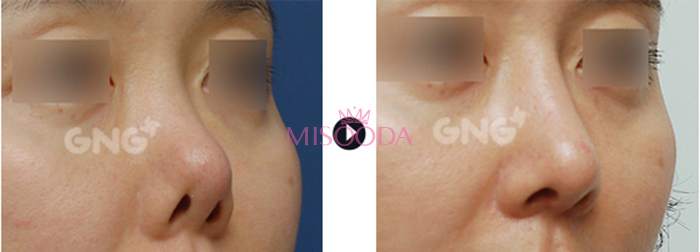
Inflammation after surgery
There is a high risk of infection when there is a lot of sebum & acne on the skin. When the implant is used up to the nose tip, it stimulates the skin and induces inflammation
Insert new implant after removing existing implant → Continuous antibiotic treatment to prevent secondary inflammation → If implants are not suitable, reconstructive surgery is performed using autologous tissueb
Revision Rhinoplasty: Capsular contracture
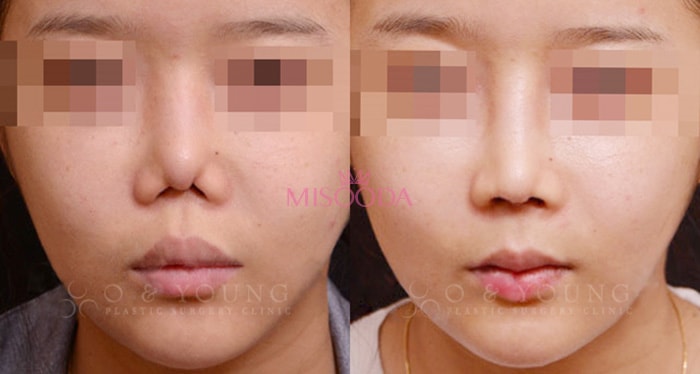
▶ Nose deformation by capsular contracture If the inflammatory treatment is not initiated early, scarring occurs on the surgical area, then the skin tissue surrounding the silicone is contracted and the nose is lifted. The scar tissues attached should be released and the tip of the nose corrected by using the nasal septum of the nose tip. If the nose reconstruction is severe, additional cartilage may be used (rib cartilage).
Revision Rhinoplasty: Nose Bridge/ Nostril
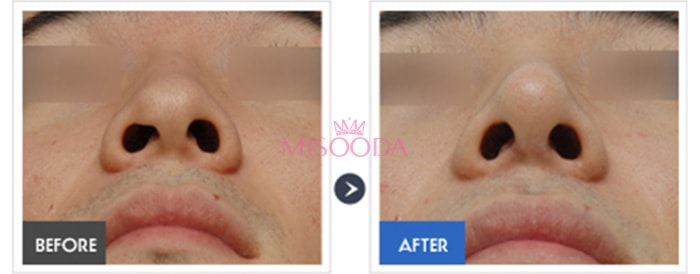
▶ In case the nose bridge or nostril is distorted or asymmetrical If the patient is operated ignoring the asymmetry of the nose, the asymmetry may get worse after the surgery. After removing the inserted silicone from the previous surgery, the curved nasal septum and tip are also corrected. If additional correction is needed, osteotomy & implant insertion can be done together.
Korean Nose Surgery/ Rhinoplasty Cost
General price guide line for Korean Nose Surgery/ Rhinoplasty is USD$900 to USD$7,500 according to Korea Health Industry Development Institute. The price is decided depending on the method and difficulty of patients’ case. The procedures below can be added on the top of general nose augmentation and the price will be in variable range.
| Part |
From (USD) |
To (USD) |
|
Rhinoplasty (Silicone + cartilage) |
3,200 | 3,800 |
| Nostril Reduction | 900 | 1,800 |
| Aquiline Nose Rhinoplasty | 3,600 | 5,500 |
| Crooked Nose Correction | 5,500 | 7,300 |
|
Nasal Bone Reduction (Osteotomy) |
4,500 | 7,500 |
To learn more about Korean Plastic/Cosmetic surgery price in Korea, check Know your plastic surgery price.
To check various types of rhinoplasty procedures,
- Nose Augmentation
- Flat nose
- Bulbous nose
- Hump nose
- Short nose
- Long nose
- Deviated nose
- Alar reduction
- Revision Rhinoplasty
Nose Surgery Precautions
Preoperative Precautions
Check: What to prepare before Plastic Surgery
Post-operative Precautions
Post-operative Precautions

